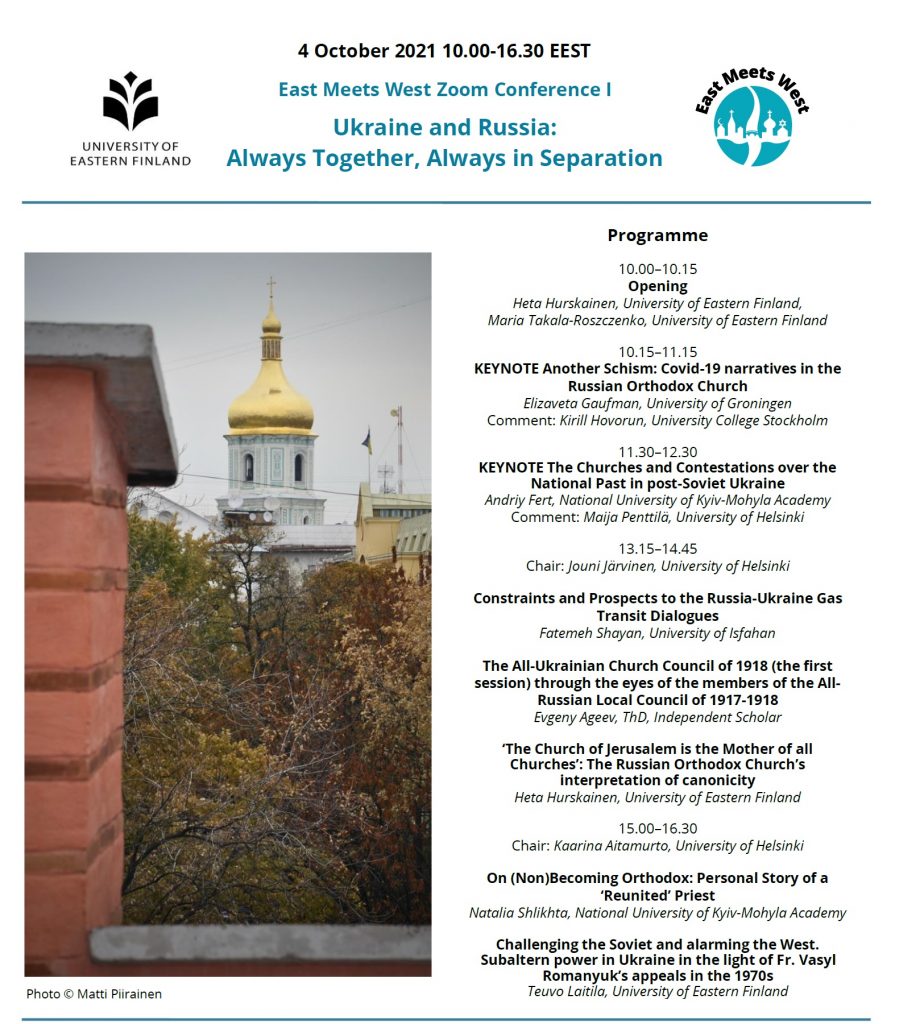Past conferences
Past Conferences
Ukraine and Russia –
Always Together, Always in Separation 4 October 2021 (Virtual)
East Meets Conference I
Russia has inspired a multitude of studies on history, politics, religion, not to mention many other areas of research. Interest in Ukrainian affairs has until recently been less intensive, excluding of course scholars with links or background in Ukraine. If Russia and Ukraine have been studied together, more attention is usually paid to the former, and from a Russian perspective. From this point of view, Kievan Rus’ has without second thought considered as the cradle of Russian culture, a mediator of Byzantine culture on its way to the North, to Moscow in the first place, where it ennobled into a ‘genuine Russian culture’.
This simplified view of course is contested, or challenged, but it still prevails. We still do not have an abundance of studies seriously focusing on the multi-layered and entangled encounters and interactions between things ‘Russian’ and ‘Ukrainian’. To illuminate and understand these things, e.g., encounters, entanglements, and interactions, is the main subject and theme of this conference. We have divided the theme on three subsections and announce here call for papers relative to them.
The conference was organised by the School of Theology (UEF), supported by the Borders, Mobilities and Cultural Encounters Research Community, BOMOCULT RC, and organised also together with the VERA Centre for Russian and Border Studies

KEYNOTE: Another Schism? Covid-19 narratives in the Russian Orthodox Church
Elizaveta Gaufman, University of Groeningen
A year and a half into the COVID-19 pandemic, the Russian Orthodox Church (ROC) is still split between those who believe that the spread of the coronavirus requires certain restrictions and “Covid-dissidents” who either believe the virus is not real or consider it a conspiracy against Russia and/or the ROC and its members. Despite the attempts of Patriarch Kirill to implement a range of mitigation measures, many local priests and believers decided to openly defy both the Church and the government by refusing to limit church services or sterilize the Eucharist items. Moreover, the pandemic was viewed as a conspiracy to undermine both Russian spirituality and economy, while some Orthodox activists claimed that a “Vatican-Washington team” uses Covid-19 pandemic to pressure the Ukrainian Orthodox Church of the Moscow Patriarchate and true believers in general. Against the background of Russia’s unique combination of neo-religiosity, neo-atheism and paganism, this presentation will explore how the pandemic exemplified a spiritual and political challenge to the Russian Orthodox Church.
KEYNOTE: The Churches and Contestations over the National Past in post-Soviet Ukraine
Andriy Fert, National University of Kyiv-Mohyla Academy
The three biggest Ukrainian churches – Orthodox Church of Ukraine, Ukrainian Greek-Catholic Church, and Ukrainian Orthodox Church of the Moscow Patriarchate – have a considerable symbolic capital in the Ukrainian public discourse. For a significant number of Ukrainians belonging to the church is an essential part of their national identity; the Ukrainian state draws heavily on churches’ symbolic capital, while the churches, on the other hand, have become powerful actors in memory politics. In this presentation, we will discuss how different Ukrainian churches contribute to the sacralization of the national past, how they contribute to the cults of national heroes and victims, and how they capitalize on nostalgia. This presentation will be about post-2014 developments – i.e., all cases will be considered against the backdrop of the Russo-Ukrainian conflict and the process of history securitization that it triggered.